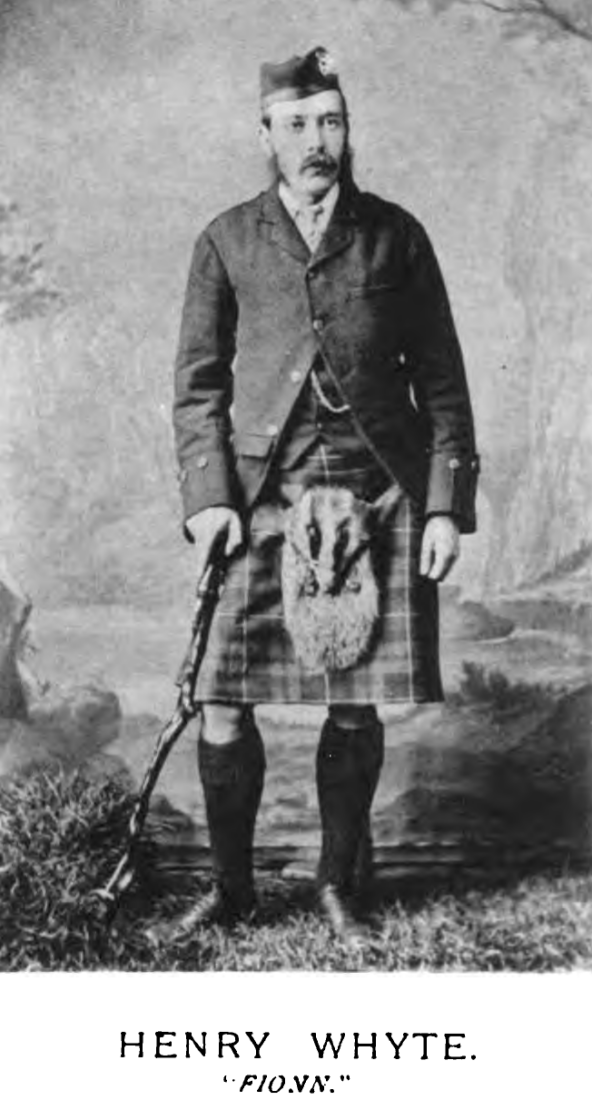|
HENRY WHYTE—better known by
his nom de plume, "Fionn” — was born at Easdale, Argyleshire, and came early
in life to Glasgow where he has been, ever since, in close fellowship with
his countrymen in every movement having for its object the advancement of
the interests of Highlanders. He is patriotic in the best sense of the word,
having long advocated the cause of the Highland people; and he enjoys their
confidence in a marked degree. From long association and frequent contact
with all classes of his countrymen, he knows thoroughly the temper of their
mind and character; and his command of the Gaelic language, which he uses
fluently and idiomatically, has caused his services to be in great demand.
In the bestowal of these he is extremely obliging. Indeed, in that
connection, it may be said his sympathies are truly catholic, as he never
shows himself to be influenced in the smallest degree by prejudices begotten
of class, creed or clan. He is Ex president of the Gaelic Society of
Glasgow, and an active member of quite a number of Highland district
Associations having their head quarters in that city. Mr Whyte comes of a
literary family whose contributions to Gaelic literature are neither few nor
unimportant. His father, the late John Whyte, who wrote for The Gael; his
uncle, the late Robert Whyte, whose poem An t-Earrach appeared in the
Teachdaire Gaidh-ealach over the initials, 0. T., and his brother John, who
writes over I.B.O. and Mac Mharcuis, are all familiar to readers of Gaelic.
But the subject of this sketch, is without doubt, best known of them all.
Part of his literary work is to be found in “The Celtic Garland,” which has
gone through two editions—a fact rare in the annals of similar Gaelic
literature—and consists of racy, humorous Gaelic letters and sketches; a
number of fine Gaelic songs, most of which have attained popularity,
designed to rescue good airs from being lost; adaptations into Gaelic of
humorous Lowland Scotch stories; and translations of Gaelic songs and poems
into English, as well as of Lowland songs into Gaelic. These last may be
regarded as masterpieces in the art of translating, conveying, as they do,
the entire meaning and spirit of the original, without, in the least,
violating Gaelic idiom. That Mr Whyte is an adept at the work of translating
English into Gaelic may be inferred from the fact that he successfully
accomplished one of the most difficult tasks that could be put before a
translator, namely, the rendering of the Crofters* Act into Gaelic. It may
be fairly contended that the revival in Gaelic Music which is now in full
swing, is largely due to his publication of “The Celtic Lyre,” a collection
of over 50 popular Gaelic songs, with music in both notations, along with
translations into English by himself and others. Mr. Whyte is, besides, the
author of a series of interesting articles on “Gaelic Songs of Love and
Labour ” which appeared recently in the Peoples Friend. It is difficult to
assess at their full value Mr. Whyte’s services to the Gaelic cause—indeed,
there is less danger of overestimating than of under-estimating them—and our
hope is that the future will enable him to lay his countrymen under still
greater obligations by services enhanced by the experience of riper years.
C. M. P.
November 1892

The Celtic garland of Gaelic songs
and readings
Translation of Gaelic and English songs by Henry Whyte |

